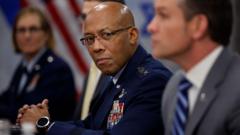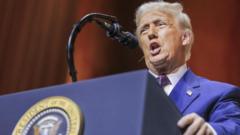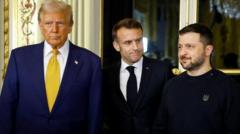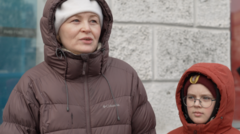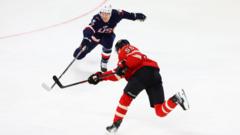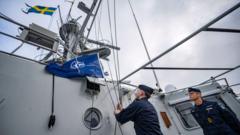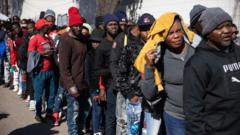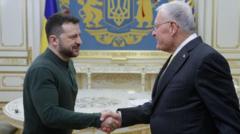In a recent interview, former President Trump expressed disapproval of current European leaders' efforts to end the ongoing war in Ukraine, while simultaneously engaging in discussions about potential peace negotiations.
Trump Critiques European Leaders Over Ukraine Peace Efforts
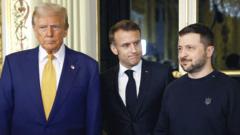
Trump Critiques European Leaders Over Ukraine Peace Efforts
Trump accuses Macron and Starmer of inaction regarding the Ukraine conflict as negotiations continue.
In an interview, former President Donald Trump has criticized French President Emmanuel Macron and UK Prime Minister Sir Keir Starmer for their lack of concrete actions to halt the war in Ukraine. As both leaders prepare for visits to the White House in the upcoming week, Trump remarked on Fox News that he believes neither has successfully contributed to the peace process, commenting specifically on Ukrainian President Volodymyr Zelensky's role in negotiations. He suggested that Zelensky possessed "no cards" and asserted that his presence in discussions is not essential.
Since Russia's intensified military campaign in Ukraine began in 2022, countries including the UK, France, and other allies have provided military and humanitarian assistance to Ukraine. Recent diplomatic activities have included a swift summit in Paris among European leaders aimed at preparing for US-Russia negotiations planned in Saudi Arabia. Amid these talks, concerns have arisen that Ukraine and European interests may be overlooked in the larger dialogue around a peace settlement.
Despite his criticisms, Trump also acknowledged his amicable relationship with Macron, describing him as a "friend," while referring to Starmer in positive terms. Both leaders are expected to visit Washington in the coming days; Macron on a Monday and Starmer on Thursday.
Starmer has spoken favorably of possibly deploying UK troops in Ukraine to further bolster security in alignment with a peace agreement. The British Prime Minister's office has been approached for commentary, reflecting a proactive stance in European discussions on Ukraine.
The United States, United Kingdom, EU, and other nations, such as Canada and Australia, have implemented extensive sanctions—over 20,000—against Russia since the invasion began, while also formalizing agreements to provide ongoing support to Ukraine. Earlier this year, Starmer reaffirmed his support for Ukraine's long-term stability, promising enduring assistance beyond the current conflict.
Keith Kellogg, who served as Trump's envoy for Ukraine, recently shared optimistic insights from his engagements with Zelensky in Kyiv. Kellogg praised Zelensky as a "courageous leader," in stark contrast to Trump’s earlier remarks labeling him a "dictator."
Zelensky has actively engaged with various global leaders urging their involvement in peace negotiations. Trump remarked that both Russia and Ukraine would be reluctant to initiate discussions without his personal input, highlighting his belief that Zelensky has not effectively used his negotiating power.
Furthermore, Trump suggested that Russia desired a peaceful resolution but noted that Putin's lack of urgency to finalize an agreement remains an impediment. Vice President JD Vance defended Trump's approach against allegations of appeasement, stressing the need for realistic negotiations given Ukraine's current position in the conflict.
Reports indicate that the U.S. and Ukraine may soon finalize a deal enhancing American access to Ukraine’s rare earth mineral reserves, which Trump framed as a means for Ukraine to reciprocate for U.S. military backing. However, Zelensky pointed out the necessity of precision in structuring any agreements, indicating initial U.S. proposals had not been acceptable.
As diplomatic efforts unfold, a range of perspectives will continue to shape the complex discussions surrounding the resolution of the Ukraine crisis and the international community's response to ongoing developments.
Since Russia's intensified military campaign in Ukraine began in 2022, countries including the UK, France, and other allies have provided military and humanitarian assistance to Ukraine. Recent diplomatic activities have included a swift summit in Paris among European leaders aimed at preparing for US-Russia negotiations planned in Saudi Arabia. Amid these talks, concerns have arisen that Ukraine and European interests may be overlooked in the larger dialogue around a peace settlement.
Despite his criticisms, Trump also acknowledged his amicable relationship with Macron, describing him as a "friend," while referring to Starmer in positive terms. Both leaders are expected to visit Washington in the coming days; Macron on a Monday and Starmer on Thursday.
Starmer has spoken favorably of possibly deploying UK troops in Ukraine to further bolster security in alignment with a peace agreement. The British Prime Minister's office has been approached for commentary, reflecting a proactive stance in European discussions on Ukraine.
The United States, United Kingdom, EU, and other nations, such as Canada and Australia, have implemented extensive sanctions—over 20,000—against Russia since the invasion began, while also formalizing agreements to provide ongoing support to Ukraine. Earlier this year, Starmer reaffirmed his support for Ukraine's long-term stability, promising enduring assistance beyond the current conflict.
Keith Kellogg, who served as Trump's envoy for Ukraine, recently shared optimistic insights from his engagements with Zelensky in Kyiv. Kellogg praised Zelensky as a "courageous leader," in stark contrast to Trump’s earlier remarks labeling him a "dictator."
Zelensky has actively engaged with various global leaders urging their involvement in peace negotiations. Trump remarked that both Russia and Ukraine would be reluctant to initiate discussions without his personal input, highlighting his belief that Zelensky has not effectively used his negotiating power.
Furthermore, Trump suggested that Russia desired a peaceful resolution but noted that Putin's lack of urgency to finalize an agreement remains an impediment. Vice President JD Vance defended Trump's approach against allegations of appeasement, stressing the need for realistic negotiations given Ukraine's current position in the conflict.
Reports indicate that the U.S. and Ukraine may soon finalize a deal enhancing American access to Ukraine’s rare earth mineral reserves, which Trump framed as a means for Ukraine to reciprocate for U.S. military backing. However, Zelensky pointed out the necessity of precision in structuring any agreements, indicating initial U.S. proposals had not been acceptable.
As diplomatic efforts unfold, a range of perspectives will continue to shape the complex discussions surrounding the resolution of the Ukraine crisis and the international community's response to ongoing developments.





